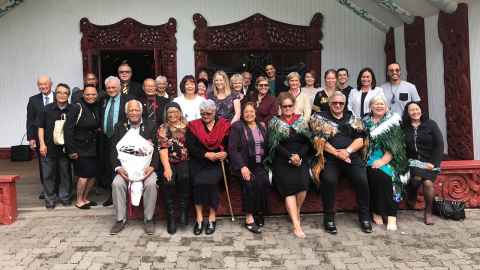Website’s digital stories highlight care of dying Māori kaumātua
29 March 2021
Te Ipu Aronui: A new website showcases whānau care of kaumātua approaching death.

A new website that focuses on Māori end-of-life experiences was launched on 29 March 2021. Short films showcasing whānau care of kaumātua as they approach death will serve as a key focal point.
The site is a response to concerns that Māori are losing knowledge of traditional end of life caregiving tikanga (customs). It is an outcome of the Health Research Council funded study, Pae Herenga. Led by Dr Tess Moeke-Maxwell (Ngāi Tai ki Tamaki & Ngāti Porou), the project was initiated by the Kāhui Kaumātua of the Te Ārai Palliative Care and End of Life Research Group at the School of Nursing, University of Auckland. The Kāhui Kaumātua felt it vital to collect this information to counter the impact of colonialism and the medicalisation of dying on Māori.
The website Te Ipu Aronui “is about the aroha (love, care and compassion) that whānau bring to their kaumātua (older person),” said Rawiri Wharemate, lead kaumātua of Te Ārai’s Kāhui Kaumātua.
The digital stories on the site feature people’s personal accounts of lived experience caring for kaumātua. They crafted them during three-day workshops held in Kerikeri, Hastings and the Kapiti Coast. Associate Professors Shuchi Kothari, Sarina Pearson and Mr Peter Simpson, of the University’s Faculty of Arts led the workshops.
“Our participants dug deep to reflect on their current experiences of caregiving, or memories of caring, then turn them into short films,” Dr Moeke-Maxwell said.
“There were many happy and sad tears in producing these taonga (treasured objects) but we believe the aroha that went into making them will help many whānau throughout New Zealand.”
Another feature of the website is its section devoted to health professionals.
“We want health and palliative care professionals to understand the difference between cultural competency and cultural safety,” Dr Moeke-Maxwell said.
“A cultural safety approach is more about recognising and reflecting on differences in power and privilege between professionals and patients, and within organisations, and is more effective for redressing inequities in health care for Māori.”
Health professionals visiting this part of the site will be able to learn critical information on colonialism, Māori identity and diversity and our various cultural end of life care and death customs.“Our tikanga are what strengthens, guides, and protects ill and dying kaumātua when they are at their most vulnerable, and they also help to fortify and uplift whānau who care for them” commented Te Ārai kuia, Whio Wharemate Hansen.
“Sharing stories about how Māori care for kaumātua is one practical way that we can support whānau to enhance their caregiving kete (baskets),” reflected Dr Moeke-Maxwell.
Media contacts
Aroha Mane | Media adviser
M: 021 244 9707
E: aroha.mane@auckland.ac.nz
Paul Panckhurst | media adviser
M: 022 032 8475
E: paul.panckhurst@auckland.ac.nz